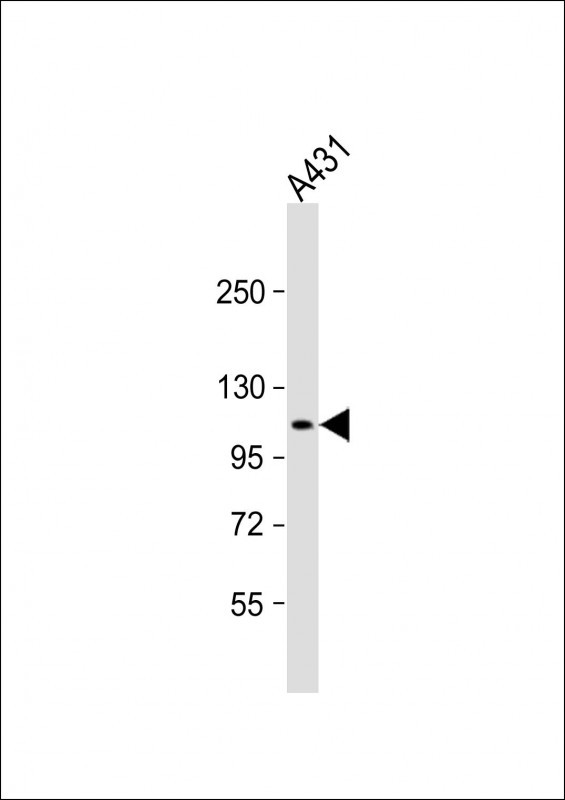
| WB | 1/2000 | Human, Mouse, Rat, Hamster |
| IF | 咨询技术 | Human, Mouse, Rat, Hamster |
| IHC | 咨询技术 | Human, Mouse, Rat, Hamster |
| ICC | 技术咨询 | Human, Mouse, Rat, Hamster |
| FCM | 咨询技术 | Human, Mouse, Rat, Hamster |
| Elisa | 咨询技术 | Human, Mouse, Rat, Hamster |
| Aliases | Digestive organ expansion factor homolog, DIEXF, C1orf107, DEF |
| Entrez GeneID | 27042 |
| WB Predicted band size | 87.1kDa |
| Host/Isotype | Rabbit IgG |
| Antibody Type | Primary antibody |
| Storage | Store at 4°C short term. Aliquot and store at -20°C long term. Avoid freeze/thaw cycles. |
| Species Reactivity | Human, Mouse, Rat, Hamster |
| Immunogen | This DEF antibody is generated from rabbits immunized with a KLH conjugated synthetic peptide between 2-30 amino acids from the N-terminal region of human DEF. |
| Formulation | Purified antibody in PBS with 0.05% sodium azide. |
+ +
以下是关于DEF蛋白N端(N-term)抗体的参考文献示例(注:DEF蛋白可能有不同指代,以下为假设性举例,建议根据具体蛋白名称进一步验证):
---
1. **文献名称**: "Characterization of a Novel N-terminal Specific Antibody for Human DEF6 in T-cell Signaling Studies"
**作者**: Yamamoto, K. et al.
**摘要**: 本研究开发了一种针对人DEF6蛋白N端结构域的高特异性单克隆抗体。通过Western blot和免疫共沉淀验证,证实该抗体能特异性识别DEF6的N端区域,并应用于T细胞激活信号通路的研究,揭示DEF6在免疫突触形成中的作用。
2. **文献名称**: "Development and Application of an Anti-N-terminal DEFA1 Antibody in Inflammatory Disease Models"
**作者**: Chen, L. & Zhang, W.
**摘要**: 文章报道了一种针对人类α-防御素1(DEFA1)N端的多克隆抗体制备。该抗体通过ELISA和免疫组化验证,成功用于检测肠道炎症模型中DEFA1的局部表达变化,为防御素在先天免疫中的功能研究提供工具。
3. **文献名称**: "Domain-Specific Antibodies Reveal the Subcellular Localization of DEF Protein in Plant Stress Responses"
**作者**: Müller, R. et al.
**摘要**: 研究利用针对DEF蛋白N端和C端的抗体比较分析,发现植物DEF蛋白的N端结构域在胁迫条件下易位至细胞核。该N端抗体通过免疫荧光和蛋白质印迹验证,支持了DEF在氧化应激信号传导中的新机制。
4. **文献名称**: "A Monoclonal Antibody Targeting the N-terminus of DEFB1 Blocks Its Antimicrobial Activity In Vitro"
**作者**: Santos, P. et al.
**摘要**: 此研究设计了一种靶向人β-防御素1(DEFB1)N端的单克隆抗体,证实其可特异性中和DEFB1的抗菌功能。抗体通过表面等离子共振(SPR)验证结合亲和力,为防御素功能研究和治疗应用提供工具。
---
**注意事项**:
- DEF蛋白可能指代不同靶标(如DEF6、防御素、植物DEF家族等),建议结合具体研究背景筛选文献。
- 实际文献检索推荐使用PubMed/Google Scholar,关键词:"DEF N-terminal antibody"、"anti-DEF (N-term)"等,并核对蛋白全称及抗体应用场景。
DEF (N-term) antibodies are designed to target the N-terminal region of the DEF protein, a less-characterized protein implicated in diverse cellular processes. The N-terminus often contains critical functional domains, post-translational modification sites, or signal peptides, making this region biologically significant. DEF antibodies are typically developed using synthetic peptides or recombinant protein fragments corresponding to the N-terminal sequence, followed by animal immunization (e.g., rabbit or mouse) and affinity purification. These antibodies enable researchers to study DEF's expression, localization, and interactions via techniques like Western blot, immunohistochemistry, and immunoprecipitation.
The DEF protein is hypothesized to play roles in cellular signaling, structural organization, or metabolic regulation, though its exact function remains under investigation. Its N-terminal region may mediate protein-protein interactions or serve as a regulatory site for modifications like phosphorylation. DEF dysregulation has been tentatively linked to certain cancers or neurodegenerative disorders, driving interest in its molecular mechanisms. The N-term-specific antibody helps distinguish full-length DEF from proteolytic fragments or splice variants, enhancing data accuracy in functional studies. Validation includes testing on knockout cell lines or tissues to confirm specificity. As DEF research advances, these antibodies will likely contribute to elucidating its physiological and pathological relevance.
×